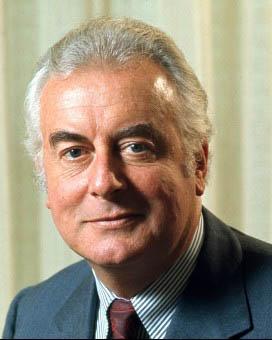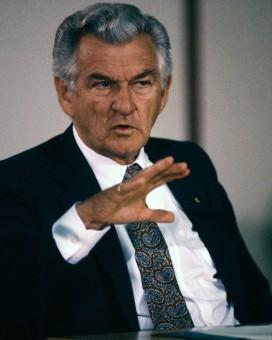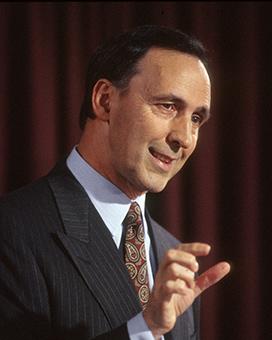On this page
1950 to 1959
10 Dec 1955: 1st elected to Federal Parliament
Fraser was elected as Member of Parliament for the seat of Wannon (Vic.), in the 22nd federal election.
1970 to 1979
21 Mar 1975: Liberal Party Leadership
Fraser defeated Bill Snedden in a leadership ballot and became leader of the Liberal Party and Leader of the Opposition.
11 Nov 1975: 22nd Prime Minister
After the Governor-General Sir John Kerr dismissed the Labor government, Fraser became ‘caretaker’ prime minister pending an election.
13 Dec 1975: 30th federal election
After the dismissal of the Whitlam government, a double dissolution election was held. The Coalition under Fraser won a landslide victory, retaining government with a much increased majority.
16 Jun 1976: Treaty of Friendship
The Australia-Japan Treaty of Friendship was signed, confirming the important trade relations between the 2 nations. By 1970, Japan had become Australia’s main overseas customer, with some 19.4% of export trade, while Britain’s share fell to 13.4%.
16 Dec 1976: Land rights
Enactment of Aboriginal Land Rights (Northern Territory) Act.
2 Feb 1977: A federal court
The 1st judges of the Federal Court were sworn in by the Attorney-General. The jurisdiction of the Court included the areas previously covered by the Industrial Court and the Bankruptcy Court. It also heard appeals from state and territory courts in specific federal matters. The Federal Court is subject only to the High Court of Australia.
7 Mar 1977: Royal visit
Queen Elizabeth II and the Duke of Edinburgh spent 3 weeks in Australia on a tour to celebrate the silver jubilee of the Queen’s reign.
21 May 1977: Referendum
Only 3 of 4 proposals put to voters were carried. These related to Senate casual vacancies, giving residents of the Australian Capital Territory and the Northern Territory the right to vote in constitutional elections, and retirement of federal judges. The rejected proposal related to introducing simultaneous elections.
15 Jun 1977: Gleneagles agreement
At a meeting in Scotland, Commonwealth countries affirmed opposition to racial discrimination in sport and insisted that South Africa must lift apartheid to compete in the 1977 Commonwealth Games scheduled for Edmonton, Canada.
1 Jul 1977: Ombudsman
The 1st Commonwealth Ombudsman took office. The Ombudsman has responsibility to investigate complaints about administrative decisions and make recommendations for remedy.
23 Aug 1977: Uranium
The Fraser government approved the mining and export of uranium.
8 Dec 1977: 19th Governor-General
Sir Zelman Cowen served as Governor-General until 29 July 1982.
10 Dec 1977: 31st federal election
The Coalition under Fraser retained government, although with a reduced majority.
1 Jan 1978: SBS begins
The Special Broadcasting Service came into operation under the Broadcasting and Television Amendment Act. It was established to provide multilingual broadcasting and television services. Regular transmissions began on 24 October 1980.
20 Jan 1978: Irian Jaya
Foreign Minister Andrew Peacock’s recognition of Indonesian sovereignty over East Timor made Australia the sole country to accept Indonesia’s military takeover in 1976.
26 Jan 1978: Land rights in the Northern Territory
The proclamation of the Northern Territory Land Rights Act in 1976 enabled traditional owners to claim unalienated land. The Act provided for a Commission to hear claims and with power to grant a limited title. This was the 1st Australian law enabling judgement of claims to traditional ownership.
1 Jul 1978: Northern Territory self-government
The Northern Territory achieved limited self-government, with a fully elected Legislative Assembly. This followed 67 years of federal administration, and a further 50 years of government by South Australia.
5 Apr 1979: Protecting our environment
An area of Arnhem Land in the Northern Territory proclaimed Kakadu National Park. In October, the 1st stage of the Great Barrier Reef Marine Park proclaimed.
7 Oct 1979: Immigration advisors
Australian Refugee Advisory Council established to advise the Minister for Immigration and Ethnic Affairs on the settlement of refugees. Large numbers of Indo-Chinese refugees had become a challenge for receiving countries like Australia.
19 Oct 1979: Federal Police
The Australian Federal Police (AFP) force was formed. It combined the Commonwealth Police, the Australian Capital Territory Police and the Federal Narcotics Bureau.
1980 to 1989
26 Jan 1980: Australian Institute of Sport
The Minister for Home Affairs announced the establishment of a national institute of sport. It began as a public company with 95% funding from the government. In January 1987, the Institute became a statutory authority under the Department of Sport, Recreation and Tourism.
29 May 1980: Coastal Waters (State Powers) Act
The Commonwealth returned control of coastal waters to the states. The federal government had taken control of these waters in 1973.
6 Jun 1980: Saving the whale
Enactment of a Whale Protection Act, after strong lobbying for the end of whaling in Australian waters.
18 Oct 1980: 32nd federal election
The Coalition retained government, although with a much reduced majority.
1 Jan 1981: The desktop computer
The 1st personal computers went on sale 30 years after the first mainframe computer, UNIVAC, had come into use.
14 Apr 1981: Human rights
Human Rights Commission Act enacted, providing for a body to promote and protect human rights in line with all United Nations instruments ratified by Australia. Australia’s Racial Discrimination Act 1975 and later the Sex Discrimination Act 1984 were also covered by the Commission, renamed the Human Rights and Equal Opportunity Commission in 1986.
30 Apr 1981: Razor Gang report
The final report of a committee set up to review government function recommended the abolition of some agencies and reduction of others.
9 Mar 1982: Open information
Australia’s 1st Freedom of Information Act was enacted.
29 Jun 1982: Falklands War
Australia lifted a ban on imports from Argentina after the United Kingdom defeated Argentina in a 10-week undeclared war on the Falkland Islands.
29 Jul 1982: 20th Governor-General
Sir Ninian Stephen served as Governor-General until 15 February 1989.
1 Jan 1983: TCP/IP enables the birth of the Internet
Adoption of the Transmission Control Protocol/Internet Protocol (TCP/IP) standard enabled the development of a supranational Internet. The 1st network of computers, ARPANET, had emerged in the United States in 1969.
3 Feb 1983: Double dissolution
Fraser announced a double dissolution of parliament. The same day, Bob Hawke was elected leader of the Labor Party after Bill Hayden resigned.
16 Feb 1983: Ash Wednesday bushfires
A devastating series of bushfires burn across south-eastern Australia. 75 people are killed and more than 3700 buildings destroyed.
5 Mar 1983: 33rd federal election
The Coalition under Fraser was defeated by Labor under Bob Hawke.
11 Mar 1983: Left office
Fraser’s term as prime minister ended when Bob Hawke was sworn in on 11 March 1983.
31 Mar 1983: Left Parliament
Fraser resigned from Parliament on 31 March 1983.
2010 to 2019
20 Mar 2015: Death
Fraser passed away, aged 84.





